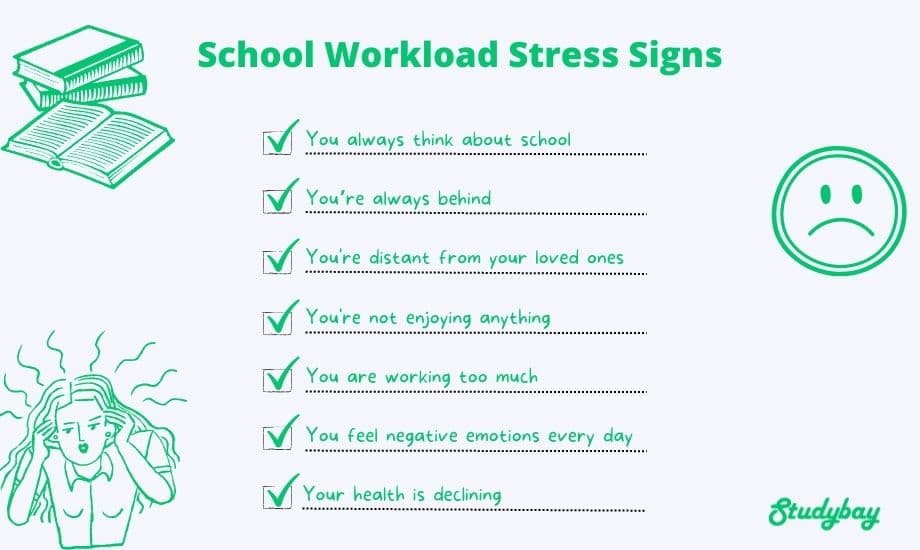
19 min
5
04.07.2023

If you’re anything like the average student, you probably feel overwhelmed by your academic workload. It does not matter if it’s your school or college degree. There is a tendency to get devastated due to unrealistic deadlines, high pressure to deliver great results or the excessive amount of information available to you at your fingertips. In today’s article, we are going to fully examine and decode the different ways in which one can combat this mounting academic anxiety.
Signs That Your Workload in School Is too Much for You

Aside from being hit with a clear realization that it is actually impossible for you to cope with the amount of work you’re facing, there are also certain signs to watch out for, including:
- You’re always “on.” With your high school workload, it might be difficult for you to turn off and just enjoy things. You are always thinking about your assignments, academic life, and everything else that goes along with being a student. It’s like it’s all you can think about.
- You’re always behind. Despite devoting a huge chunk of your free time to studying, there’s always this need to catch up. You are behind on your assignments, you are behind in your sleep schedule, and you are even behind in other areas of your life because of unhealthy workloads.
- You have grown more distant from your loved ones. If you’re a full-time student with a hefty workload, it’s probably safe to assume that you’re not keeping up with your friends. Not doing this means that you are overworked and missing out.
- You are not enjoying it. Student engagement is an important thing. Students interested in their academic lives always know how to manage a large workload, but once this becomes unbearable, they stop enjoying even their favorite subjects.
- Your hours are too much. There is not a fixed number of hours that is considered “too much,” although most would argue that if one works/studies over 50-60 hours per week, it is not really a sustainable schedule. But the main point here is that YOU think that you are working too much.
- You feel negative emotions every day. Stress, anxiety, anger, etc., are strong and negative emotions and tend to pop up whenever your college workload becomes overwhelming. Sound familiar? Perhaps not all college students are supposed to work themselves into the ground!
- Your health is declining. Working and stressing yourself out too much is one of the most effective ways to reduce your life expectancy and overall well-being. Exhaustion, loss of sleep, depression, and poor eating habits will undoubtedly contribute to you developing serious health issues, which in turn affects your quality of life.
Tips on How to Manage College Workload
You are probably wondering how you can manage the colossal amount of work, right? Based on the telltale signs above, you probably are feeling overwhelmed pretty much every day. Don’t worry; there are ways to manage this overload effectively. By utilizing these tips, you can say goodbye to that awful, awful feeling of stress and anxiety and start enjoying your life.
Tip #1: Study Effectively ✍
If you’re struggling with your workload, then perhaps you are not as efficient as you should be. Here are the top tips on how to study in a more efficient fashion:
- Be consistent. Consistency is key when it comes to managing a heavy school workload. College students who divide their assignments into more manageable chunks, each of which is to be completed within a fixed timeframe, are generally more successful in completing their work.
- Get enough sleep. When talking about mental health and academic success in college, it’s vital to mention that you should never, ever sacrifice your health and sleep for your grades. You must make sure that you get enough sleep so that you are always at your most productive.
- No distractions. Studying in a quiet and distraction-free environment can help you concentrate better. Turn off your phone or put it on silent mode, avoid social media, and find a place where you can focus solely on your work. But do not skip extracurricular activities just to manage your grad school workload.
- Get organized. Homework planners and other tools will help you. With this toolbox, you’ll easily be able to figure out how to manage a heavy workload effectively. Organizational and student time management skills are very important to everyone, not just new students.
- Always ask questions. How to handle a heavy workload at school? If you ask more questions, you get more detailed answers. If you “get” everything there is to get, you will not need to spend so much time figuring out certain concepts or abstract theories. Never stop being curious.
Tip #2: Get All the Help You Need 🆘
Want to know how to set priorities and manage workload? With all the outside help you need, of course! Asking for help is never a bad idea, especially when faced with a subpar workload balance.
- Ask your teachers. This ties into the last piece of advice from the previous section. Always asking questions and seeking advice from your teachers is essential. Many people in college will have a problem with this, but getting help from your educators is one of the best ways how to manage the workload.
- Ask your parents. While college homework might be out of your parents’ attention, they are definitely well-equipped to help you with your assignments. Most parents are usually aware of the homework workload and student’s stress levels related, so they will make time to help you out.
- Ask fellow students. Chances are that most students you interact on a daily basis with are pretty much in the same boat. They study insane hours per week; they struggle every day. Together, you can help each other lessen school workload stress in a major way.
- Hire professional help. Sites like Studybay allow you to hire professional writers and a whole host of other specialists to help you with your homework. Stressing about equated hours, credit hour accounting, part-time activities, and other things will throw you off your game. Hiring a professional will help you get your tasks done efficiently and save you time.
Tip #3: Use Self-Talk 🧠
Talking yourself into completing your homework in a timely fashion will greatly improve your efficiency. Talking yourself into feeling calm, collected, and in control is one of the best tips for coping with high school workload. Here is what you can do:
- Talk yourself into focusing on one thing only. Whenever you are seriously overwhelmed by the college workload, go into hyperfocus mode. You only need to do this one thing and one thing only. Everything else is irrelevant.
- Accept the inevitable. You are going to have your fair share of ups and downs throughout the academic year. Occasionally you are going to come up short due to being overworked.
- Try to focus on the now. Always ask yourself what the best action to take at the present moment is. Worrying too much about the future or mistakes made in the past might cause you to miss out on the best opportunities available.
- Be realistic. Always have a laundry list of things that can be realistically completed in a day. Consider words per minute and other things to figure out how much you’ll be able to accomplish in any 24-hour period.
- Turn it into a positive. How to manage your workload? Tell yourself that you like to keep busy, and, as a byproduct of that, you will inevitably feel overwhelmed at times. Increased workload yields not only increased stress but also increased satisfaction, productivity, and achievements.
Tip #4: Always Be Planning 📆
Having a solid plan is a great way to overcome daily workload stress successfully. Keep in mind that in today’s world, there’s a myriad of different planner options, including physical and digital. Here are the best tips for how to manage an overwhelming workload through the power of planning:
- Stay on top of your deadlines. Offsetting your insurmountable school workload is easy if you have all the deadlines written down. Even at the college level, it is a must.
- Plan your rest time in advance. The question is always “How many classes should I take per semester?” and not “How many naps should I take per day?”. Our success-driven culture makes it absolutely necessary to plan your rest far in advance. Make sure not to miss out on it.
- Figure out what suits you. As mentioned above, there are numerous planners. There are different studying styles and strategies. You need to figure out the best way to go about your university homework or extracurricular tasks.
Tip #5: Have Your Priorities Straight 📋
When discussing how to manage a high workload, prioritizing needs to be at the forefront of everything. Giving yourself a set of priorities, achievable goals, and a plan of action will significantly improve your efficiency. Here are the best tips on prioritizing:
- Create a list. Having a list for any reason is a good thing, but this is especially important when you have been overworked and are looking to accomplish more. Having a list of prioritized tasks is a great way to see what you should do now. Want to learn how to manage workload stress? Have a list.
- Keep the bigger picture in mind. Even people with the most balanced workload need to do this.
- Delegate. Studybay will gladly take care of a lot of assignments for you, for example, a perfect essay written in accordance with class guidelines. With us offloading the work, you can manage your workload better and focus on the most important tasks.
- Divide large tasks. The best solution for how to manage an unrealistic workload is to make it realistic. Almost any workload becomes more realistic and manageable if you break it down.
- Reward yourself. Heavy course load necessitates major rewards. Don’t be scared to reward yourself after all you have been through while finding ways how to manage the college workload.
Conclusion
Although it might seem impossible to figure out how to effectively manage the workload at college, the key to overcoming it and, finally, having fun is to stop treating it as one of the biggest academic stressors out there. Sure, it can seem overwhelming, but with enough planning, reading, and thinking, you can certainly manage it. There’s a lot of information out there concerning how to manage a university workload and how to survive long office hours.
The most important thing to understand is that you are not alone in this — many people struggle. Many people need help, and many SEEK help. If your workload proves to be too much even after all your planning and outside assistance, maybe it’s time to explore your options and consider not just how to manage the workload effectively with conflicting deadlines and priorities but how to decrease the burden of less academic work.
FAQ
What skills do you need to handle a heavy school workload?
You need a whole list of skills to handle an above-average workload in school effectively. The most important skill is planning. With no planning, any larger task will seem overwhelming at every turn.
Do you have any tips on how to manage workload stress?
When overwhelmed by the university workload, you might suffer from high levels of stress. To manage the stress triggered by workload, you need to prioritize your tasks, break them down, get enough rest, and seek outside help. Those are only a few tips on how to eliminate the root cause of stress.
Is school workload stress inevitable?
Unless you are a very calm, confident person by nature, it probably is. But that is no reason to continue pushing through stress caused by your college workload. Follow any of our tips to decrease the burden and eradicate all those traces of stress.
References
Brown, P.C., Roediger III, H.L. and McDaniel, M.A. (2014). Make It Stick: The Science of Successful Learning. Cambridge, Massachusetts: The Belknap Press of Harvard University Press.
Yangdon, K., Sherab, K., Choezom, P., Passang, S., & Deki, S. (2021). Well-being and academic workload: Perceptions of Science and technology students. Educational Research and Reviews, 16(11), 418-427.
“Study Skills and Managing Your Workload.” [online] Trinity Hall. Available at: https://www.trinhall.cam.ac.uk/2023/02/07/study-skills-and-managing-your-workload/ [Accessed 31 Mar. 2023].
Koch, A. (2018). “How Academic and Extracurricular Workload and Stress Impacts the Mental and Physical Health of College Students.” [online] Available at: https://ecommons.udayton.edu/cgi/viewcontent.cgi?article=1164&context=uhp_theses.
Nagoski, E. and Nagoski, A. (2019). Burnout. Ballantine Books.
Newport, C. (2007). How to Become a Straight-A Student: The Unconventional Strategies Real College Students Use to Score High While Studying Less. New York: Broadway Books.
Yangdon, K., Sherab, K., Choezom, P., Passang, S. and Deki, S. (2021). “Well-Being and Academic Workload: Perceptions of Science and Technology Students.” Educational Research and Reviews, [online] 16(11), pp.418–427. doi:https://doi.org/10.5897/ERR2021.4197.



